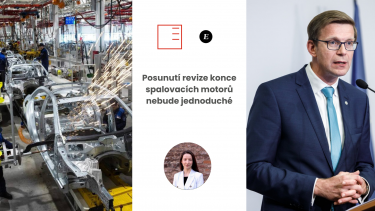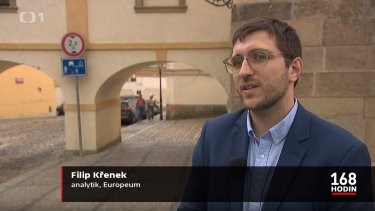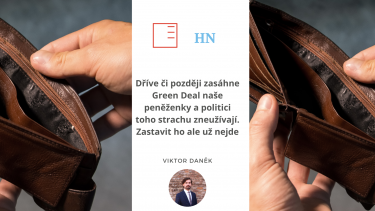Ekonomický deník | Postponing the revision of the end of internal combustion engines will not be easy
Czech Minister of Transport Martin Kupka announced at the end of September, following the example of Italy, that the revision of the end of internal combustion engines should take place earlier than in the originally planned 2026. Rebeka Hengalová, researcher at EUROPEUM Institute, commented for Ekonomický deník.
Zjistit více168 hodin | Who is the surprise of the European election?
Filip Turek, originally an outsider, pulled the Přísaha and Motorists coalition into third place and gained more than ten percent of the vote. He bet on a ban on internal combustion engines and social networks. How realistic are his election promises? Who did he take votes from and who helped him? Filip Křenek, Project Coordinator and Analyst at EUROPEUM Institute, commented on the topic for Czech Television's investigative programme 168 hodin.
Zjistit více
Hospodářské noviny | Sooner or later the Green Deal will hit our wallets and politicians are exploiting that fear. But it can't be stopped anymore
The Green Deal is becoming one of the main topics of the upcoming European Parliament elections. Candidate parties emphasize its importance and influence on future politics, with the expected changes affecting various sectors of the economy and the daily lives of citizens. In particular, the amendments to the rules for the ban on the sale of cars with internal combustion engines from 2035 and the upcoming ESG reporting, which could mean a significant administrative burden for medium-sized companies, are being discussed. The transformation towards green technologies brings both opportunities and challenges, and the outcome will depend on the skills and strength of individual negotiators in the coming negotiations. Viktor Daněk, deputy director of EUROPEUM Institute, discussed the topic in the Hospodářské noviny podcast.
Zjistit víceBlog | Prague passable - or clogged? The dilemma of sustainable transport in the city
Prague faces increasing dependence on intensive car traffic, leading to growing problems with traffic, parking and deteriorating quality of public space. The increased number of vehicles means not only pressure on safety and traffic fluidity, but also environmental risks associated with internal combustion engines. Despite growing public support for public transport and car traffic regulation, finding a compromise between individual convenience and urban sustainability remains a challenge.
Zjistit více
E15: EU emission standards will not be enough for China. Beijing is preparing its own rules
The EU countries have decided that the sale of new cars with internal combustion engines will end by 2035 at the latest. Although this is a highly controversial move in the Czech Republic, it is unlikely to be of much significance in the context of the global new car market. The new Euro 7 emissions standard will be the same. Our Senior Research Fellow Vít Havelka commented on this topic.
Zjistit více
EU-Pacific Talks: In-EV-itable future of automotive industry: what is the role of the Pacific region
We would like to invite you to the debate called "EU-Pacific Talks: In-EV-itable future of automotive industry: what is the role of the Pacific region" in the EU-PACIFIC Talks series. The debate will take place online on Tuesday, May 30 at 13:00.
Zjistit více
ČT24: Disinformation about the ban on cars with internal combustion engines
Our project manager Tatiana Mindeková commented on the growing misinformation about combustion engines and the Green Deal in the CT24 Newsroom.
Zjistit víceTA3: Dispute over internal combustion engines settled
Germany and the European Commission resolve a dispute over internal combustion engines. Synthetic fuels get an exemption. However, the details of the new agreement have not yet been made public. Our researcher Vít Havelka tells TA3 what this means for motorists and the economy.
Zjistit více
Policy Paper | The future is electric: role of Visegrad countries in the EV battery supply chain
The car industry is a crucial player for the economies of each Visegrad country, but to remain competitive adaptation is necessary. Since the shift from ICE to EVs leads to a substantial need for Critical Raw Materials (CRM), the V4 countries have and must continue to position themselves along the different parts of the EV battery supply chain from mining, refining to manufacturing, reuse and recycling as well as R&D into new battery chemistries. The future is electric: role of the Visegrad countries in the EV battery supply chain report addresses areas for Visegrad countries to ensure a sustainable and reliable EV battery supply chain.
Zjistit více PDF
Policy Paper | The future is electric: role of Visegrad countries in the EV battery supply chain
Automobilový průmysl je pro ekonomiky všech visegrádských zemí klíčovým hráčem, ale pro zachování konkurenceschopnosti je nutné se mu přizpůsobit. Vzhledem k tomu, že přechod od vozidel s vnitřním spalovacím motorem k elektrickým vozidlům vede ke značné potřebě kritických surovin (Critical Raw Materials - CRM), země V4 se musely a musejí i nadále snažit zaujmout pozici v různých částech dodavatelského řetězce baterií pro elektrická vozidla, od těžby, rafinace až po výrobu, opětovné použití a recyklaci, jakož i výzkum a vývoj nových chemických technologií baterií. Zpráva The future is electric: Role of the Visegrad countries in the EV battery supply chain (Budoucnost je elektrická: role zemí Visegrádu v dodavatelském řetězci baterií pro elektromobily) se zabývá oblastmi, v nichž mohou země Visegrádu zajistit udržitelný a spolehlivý dodavatelský řetězec baterií pro elektromobily.
Zjistit více PDF
Staroměstské náměstí 4/1
Praha 1 - Staré Město
110 00
tel.: +420 212 246 552
email: europeum@europeum.org
https://www.europeum.org








